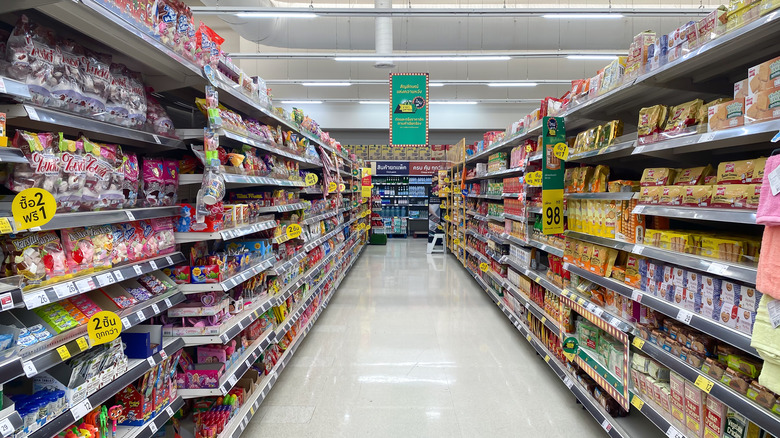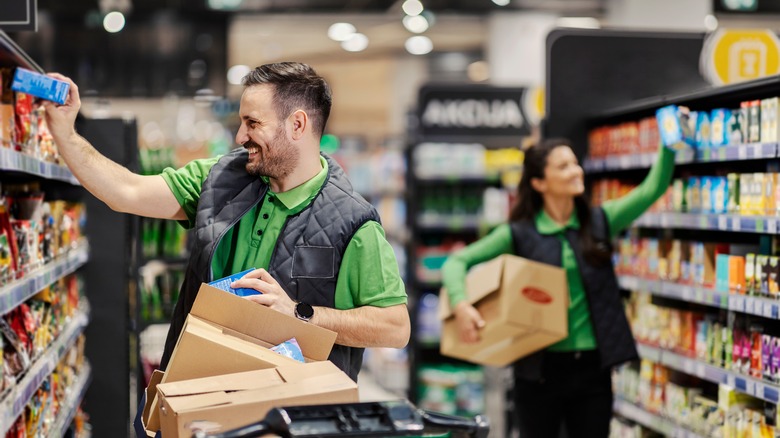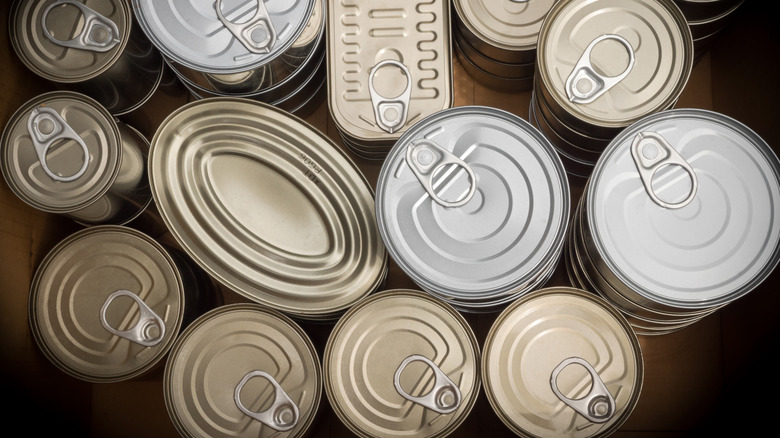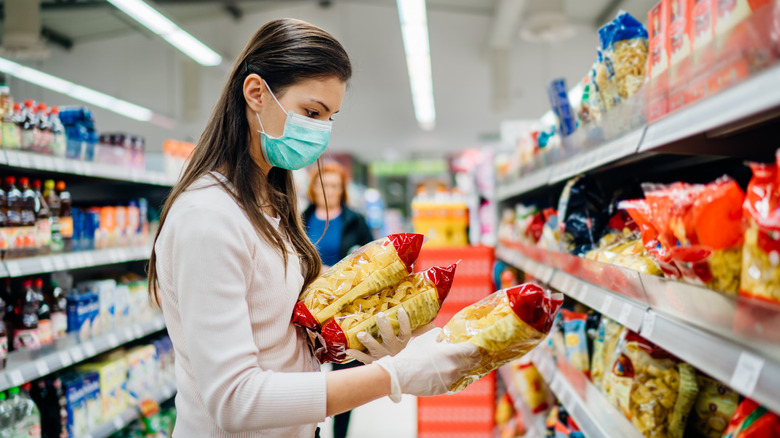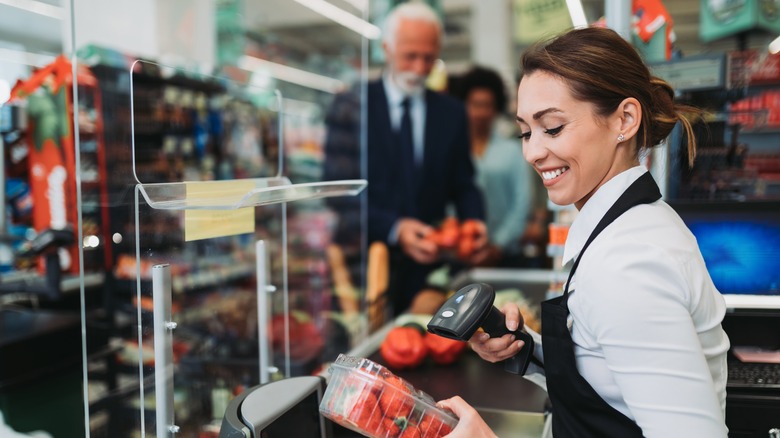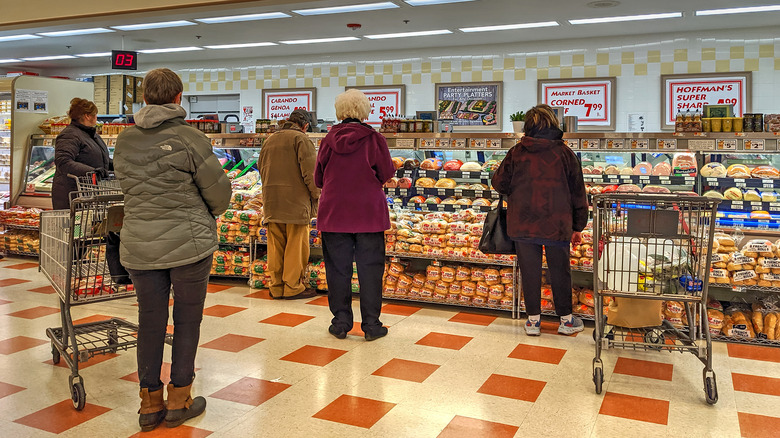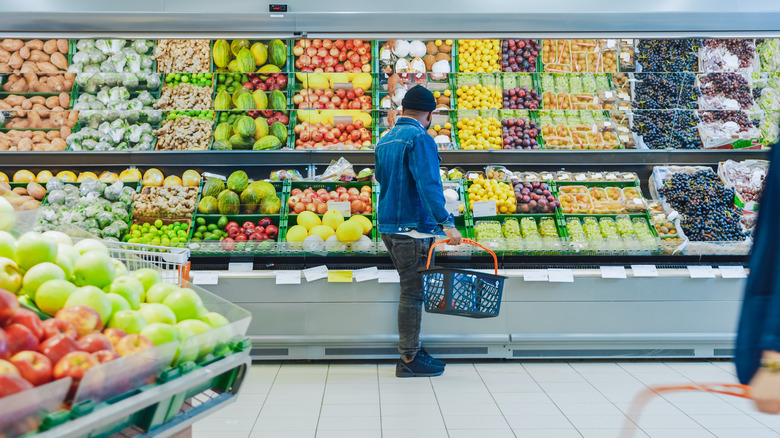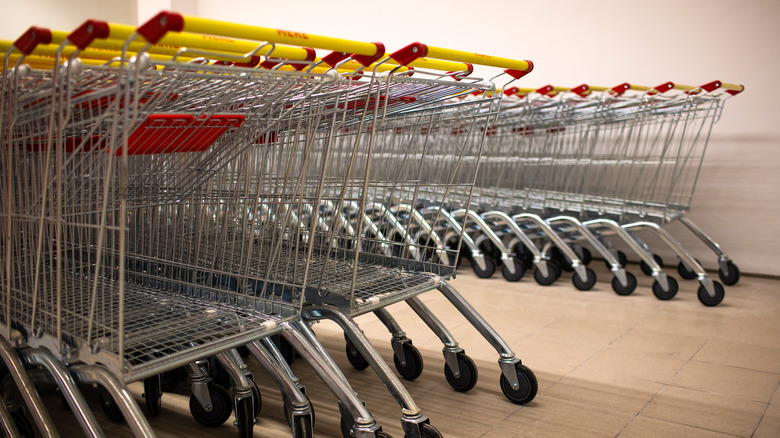9 Red Flags That Could Indicate A Bad Grocery Store
Grocery shopping is probably something you do not think twice about. Once a week, or so, you head to your usual market to buy all your essentials, you go back home, and you return again several days later. This routine errand most likely does not spark any thought of whether other locations can serve you better, however. After all, depending on where you live, there are many supermarket chains out there to choose from, but once settled on one of them, most people will go back there again and again for the rest of their time living there.
Well, whether or not you are getting the most out of your grocery haul every week should be considered. This seemingly trivial chore does take up roughly an hour of your time, and shoppers deserve to get the best experience for that time. If you begin to take notice and find that you are not, switching to a different market that is better at what they do may provide a better experience that you did not realize was out there. Here are some warning signs that should make you rethink your grocer and, perhaps, make you start looking elsewhere.
The store is cramped or dirty
This may seem like an obvious thing to consider, but many people do not actually take a moment to look around their grocery store and really examine the cleanliness of where they buy their food items. You may think this is not a very important factor because most products you buy at the supermarket are factory sealed or picked off of shelves, but this mainly has to do with the store you shop at taking pride in the business it provides. As is the case with any business, employees keeping their workplace presentable and dignified does make for a better customer experience.
As for spaciousness, wheeling around a big shopping cart is quite a clunky way to move around, so aisle space within the grocery store is vital. Aisles should allow for at least two carts to pass through. If not, you may be forced to make a U-turn out of your way if another customer enters the same aisle as you in the opposite direction. The more room to shop, the merrier.
Things are disorganized
The layout of a supermarket is vital. Most grocery shoppers have their routine store's layout seemingly memorized. Almost every grocery store will have the dairy section on one end, the produce on the other, and the meats along the back. The aisles in between these three spots should be as organized as possible, though.
Not only should items be on the shelves where they belong, but the shelves themselves should also go with whatever else is in that aisle. For example, it only makes sense for boxes of pasta to be in the same aisle as jarred sauces, or for the sugar and flour to be next to other baking needs like chocolate or spices. Walking from one end of the store to another to find something that is naturally used along with something elsewhere just adds time to your supermarket visit, and most shoppers would probably agree that the quicker they can finish and get on with their day, the better.
Cans are dented
You have probably noticed canned foods or other factory-packaged products a little damaged, even if it is just a small dent or tear. These small quirks may seem harmless, but they should most definitely be avoided. Obviously, if a food item is already opened, you should not put it in your cart. Instead, notify a store employee. It is understood that mistakes do happen and there may be an opened item on a shelf once in a while, but an increased number of damaged goods should prompt a reconsideration of where you buy your groceries.
Dented or damaged goods can actually represent serious health risks. According to Larimer, canned foods have two different kinds of seams, side seams and end seams. End seams are situated on the tops and bottoms of cans, and side seems, typically covered by labels, are unsurprisingly found on the sides of cans. Direct damage on either seem can cause the food inside to be unsafe, but minor nicks in the middle of a can or on the rim are more than likely safe. Generally, if you come across a damaged product, just pick another one. If all the items in front of you are damaged, it's probably best and safest to shop for them elsewhere.
Products are expired
This is another red flag that goes without saying, but an exorbitant amount of expired products on supermarket shelves definitely warrants rethinking where you get your groceries every week. Not only can failing to realize the item you're buying is expired lead to health concerns from ingesting food that has gone bad, but it only goes to show that the store you bought that food from does not care to check its inventory for the most up-to-date, freshest products.
Just as coming across a couple of damaged goods does happen once in a while, it is understandable to see an expired product here and there. The main concern is when it becomes a regular occurrence. Then, you will have to check the expiration date of every item you pick up before placing it in your cart. At this point, it is probably best just to find another place to shop for groceries.
Rude customer service
Mistakes are bound to happen once in a while and can occur without the fault of store employees. One thing that is always under the control of the staff, however, is how they treat their customers. Of every single red flag listed in this article, there is nothing more important than being treated respectfully and with kindness. Additionally, there is nothing more simple.
Shopping for groceries may be a chore you have to do, but that does not mean it can't also be a pleasant experience. Putting aside organization, quality of products, and even cleanliness, the one thing that goes the furthest toward a good grocery store experience is positive interactions with other people while you are there.
Of course, everybody has their bad days, and one bad interaction with a store employee probably does not warrant the abandonment of that store. A constant unkindness or general poor energy within a supermarket is not worth dealing with every week. Finding a place to shop where employees respect and are happy to help customers will make your weekly trip that much better.
Long wait times
As mentioned earlier, the majority of grocery shoppers just want to get in, find what they need, check out, and head back home. However, if you have specialty meats or seafood on your shopping list, you are bound to end up taking a number from a counter, hopping on the back of a line, and waiting for your number to be called.
Unfortunately, some supermarkets may be understaffed or have inexperienced staff. Whatever the reason, the line for cold cuts, a cut of meat, or an order of fresh seafood should not take an extensive amount of time. The thing is, you really don't have a choice. It is not like you can take a number, continue with your shopping, and come back later. If your number is called and you are not there, they will simply move on.
If you find that your waiting time at a counter is taking up a significant amount of time in the store, it may be wise to leave those specific products for a trip to a butcher or fishmonger, or maybe just find a more time-efficient supermarket to go to altogether. For most, time is of the essence when you are out running errands, so any way to keep on your daily schedule is worth making that adjustment.
Poor-quality produce
Ask anyone who knows what they are doing in the kitchen, and they will tell you whatever you cook will only be as good as the ingredients you use. When it comes to produce, quality and freshness are of the utmost importance.
First of all, no fruits or vegetables in the produce section of your grocery store should ever be moldy, rotten, or even overripe. Anything you pick up should either be at the perfect age or close to it. Even buying fruits or vegetables that are underripe is a good option to have, in case you do not plan on using them for a few days. Apples should be crisp, lemons and limes should be soft, pineapples should be fragrant, bananas should be bright yellow, and so on.
When grocery shopping, you should do your best to buy the freshest produce possible. It is understood that products labeled as "organic" are more expensive and harder to come by, but you do not have to spend a lot on quality ingredients. Even non-organic products can be just as good, as long as they are fresh and well taken care of.
Bad odor in meat or seafood section
When shopping for meat or seafood, it is more difficult to tell whether or not it is fresh by the way it looks. One reliable indicator of the freshness of meat or seafood is by its smell. Basically, the smell you should be looking for is one that is mild and not unpleasant. For products like beef, there really should be little to no detectable smell at all. Beef that has gone bad will emote a rancid, almost tangy kind of smell and should be completely avoided, according to Healthline. As for seafood, you will want to avoid any products that have a strong fishy smell or any that smell sour, per the U.S. Food and Drug Administration.
If you are given products by the store butcher or from the seafood counter in your grocery store, and they do not smell like they should, you should definitely find another place to shop. Eating spoiled meat or seafood is not only a waste of your money, but it can also cause serious health issues from bacteria exposure. Again, the quality of ingredients matters, and if you are going to spend your money, it should be put toward the best you can get.
Shopping carts are damaged or scattered
If you are out grocery shopping for the week, you will need a shopping cart. You may not have considered the quality of your shopping cart in the past, but this is because most of them are kept in good condition, and the ones that are not are rightfully taken in for repair. However, we have all mistakenly picked that shopping cart with the one wheel that becomes stuck and refuses to turn in the direction you want it to.
This is one of the less serious damages a shopping cart can endure, but the others with snapped wires can be sharp and dangerous to yourself, other shoppers, or the items you place inside the cart. If you seem to struggle to find a working cart where you shop for groceries, it may be time to find another store.
Furthermore, if you struggle to find a cart at all and do not like having to walk across the entire parking lot to get one, it may be time to shop elsewhere. While most stores have employees dedicated to rounding up scattered carts and organizing them neatly close to the entrance of the store, there are supermarket parking lots full of carts spread out all over, taking up parking spots and nowhere near where they should be. A cart should be on your shopping list. You should be able to park your car, find one with no problem, and begin shopping right away.

